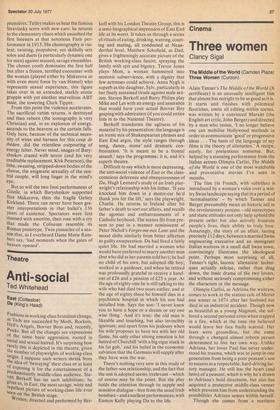Theatre
Anti-socia
Ted Whitehead
East (Cottesioe) Da (King's Head) Fashions in working-class brutalism change, as Teds are succeeded by Mods, Rockers, Hell's Angels, Bovver Boys and, recently, Punks. But all the changes are expressions of the same basic aggression, rooted in social and sexual hatred. It's surprising how rarely this is depicted in the theatre, given the number of playwrights of working-class 'origin. I suppose such writers shrink from the idea of 'betraying' their class or at least of exposing it for the entertainment of a Predominantly middle-class audience. Steven Berkoff has no such inhibitions: he gives us, in East, the most savage, witty and repellent picture of working-class life ever seen on the British stage.
Written, directed and performed by Ber koff with his London Theatre Group, this is a semi-biographical impression of East End life at its worst. It takes us through a series of rituals of eating, drinking, warring, court-ing and mating, all conducted at Neanderthal level. Matthew Schofield, as Dad, gives a frighteningly accurate picture of the British working-class fascist, spraying the family with spit and bigotry. Trevor Jones plays Mum, a woman hammered into moronic subservience, with a dignity that few actresses could achieve. Anna Nygh is superb as the daughter, Sylv, particularly in her finely sustained tirade against male sexism. Steven Berkoff and Barry Philips play Mike and Les with an energy and assurance that would have your actual Bovver Boy gasping with admiration (if you could entice him in to the National Theatre).
Berkoff transforms the ugliness of his material by his presentation: the language is an ironic mix of Shakespearian phrases and East End argot, the style, ranges through song, dance, mime' and dramatic confrontation. 'It is meant to be a frontal assault,' says the programme; it is, and it's superb theatre.
Difficult to say which is more depressing, . the anti-social violence of East or the classconscious deference and obsequiousness of Da, Hugh Leonard's study of an Irish playwright's relationship with his father. 'If you knocked him down In a motor-car he'd thank you for the lift,' says the playwright, Charlie. He returns to Ireland after his father's death to sort out affairs, and recalls the agonies and embarrassments of a Catholic boyhood. The scenes flit from present to past in a manner reminiscent of Peter Nichol's Forget-me-not Lane and the mood shifts similarly from bitter affection to guilty exasperation. Da had lived a fairly quiet life. He had married a woman who would have preferred to marry another man (but who did as her parents told her); he had no child of his own, but adopted are boy; worked as a gardener, and when he retired was profoundly grateful to receive a handout of £26 and a pension of £25 a year. At the age of eighty-one he is still talking to the wife who had died two years earlier, and at the age of eighty-three he himself dies in a psychiatric hospital in which his son had installed him. Says the son:'I never knew you to have a hope or a dream or say one wise thing.' And it's true: the old man is likeable and touching, but also invincibly ignorant; and apart from his jealousy when his wife /proposes to have tea with her old flame, his only other strong emotion is his hatred of Churchill 'with a big cigar stuck in his fat gob,' and his belief in the economic salvation that the Germans will supply after they have won the war.
There's nothing very new in this study of the father-son relationship, and the fact that the son is adopted seems irrelevant — which of course may be the point. But the play holds the attention through its supple and sensitive dialogue — free from the usual Irish bombast— and excellent performances, with Eamon Kelly playing Da to the life.


































 Previous page
Previous page